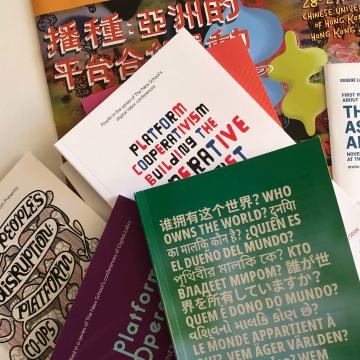Open Food Network – making food systems fair and sustainable
Blog post

Open Food Network UK is a co-op of co-ops whose members collectively own and control an innovative software platform they use to trade the food they produce.
UnFound is a UK-based accelerator and business support programme for platform co‑ops. As part of our ongoing support of the programme, we’re publishing a Q&A series, in partnership with Stir to Action. The interviews are with a group of platform founders who share their experiences of building teams, raising finance, and user experience. See our UnFound Accelerator pages for more information and to find out when the next programme is running.
Open Food Network's membership comprises food hubs, farmers, growers, community food enterprises, shoppers and buyers. People have used the power of the platform to create food collectives, manage food hub stock or take their farmer’s market online. It’s part of a growing innovative global community making fair food systems work for everyone.
We spoke to Lynne Davis, Chief Executive of Open Food Network UK.
What gave you the initial inspiration and confidence to start a platform co-op?
When Open Food Network (OFN) UK started we did not know what a platform co-operative was. The group that started OFN UK were four different existing food enterprises that were all using another piece of software which was hard to maintain, and which we were all managing separately. We understood that we wanted to mutualise our efforts and started working with a group in Australia that were developing open-source software (OSS) that fit with our needs: the Open Food Network. We understood that we wanted to work as a co-operative, building a movement around this software in the UK. When we learned of the concept of a platform co-operative, we realised that this was exactly the model that we wanted to build. So we were able to draw inspiration from the existing movement to guide our strategy.
Our confidence in pursuing this strategy came from the fact that we were an existing collective using this software. We’d also done a lot of work linking with other similar projects across the UK in preparing to find funding to redevelop our own software. The combination of a small number of very committed users and the wider network of potential users gave us the confidence. The fact that we could leverage an existing OSS platform gave our first funders, Esme Fairbairne, the confidence to fund our approach.
In the platform economy, the initial unpaid labour involved in building a product is a trade-off for the promise of a big payout when the business is eventually sold to an external investor. How do you build a team where this option does not exist? Can you explain your story so far?
The initial seed funding for the project came from an Australian crowdfunding campaign alongside seed funding from public institutions in Melbourne. The seed funding was enough to get the initial prototype off the ground, but was supplemented by a huge amount of volunteer labour. The OFN platform is built on a very strong vision around the realisation of food sovereignty locally and globally. This vision continues to attract committed people to the project who invest significant time and effort not for future financial rewards, but for a future vision of the world we all want to live in – a world in which every person has sufficient access to high quality food that regenerates the planet.
Many people involved in building the platform come from a food systems background and understand the economic and social realities that have driven our food systems for decades. Factors such as low margins, environmental externalities, and low income all contribute to the unjust food systems we all experience. Hence, in building the platform, we are consciously working to create tools and systems that readdress these social and economic inequalities. Our focus on these systemic issues enables us to access grant funding that supports the work.
Financing a platform co-operative is a challenge, but there’s excitement about testing existing forms of equity in the sector. What’s your funding mix and how do you see it changing in the next five years?
Currently our funding is 80% grants and 20% income from user fees and consultancy. Over the next five years we’d like to reduce this to 50% grants and 50% revenue streams. The OFN France community is developing a social investment model and this is something we’d be interested in exploring in the UK.
Platform co-ops are about rebalancing power but this can be unavoidably complex. How do you find the right governance model that offers a ‘cultural fit’ for your community and business purpose?
The ‘right’ governance model is one that is constantly evolving. We aim toward a sociocratic model built around governance circles in areas of practice. In practice there is a huge amount of knowledge within the minds of more experienced community members and often these community members are needed in a vast number of circles. We are investing the time in sharing this knowledge and skills more evenly across circles but it takes time.
We put quite a lot of effort into realising our culture within the organisation. We are constantly exploring ways to do team processes such as reviews in a non-hierarchical way. We have processes around the Heart – a heart channel on Slack and a monthly heart check-in that allow us to share more of ourselves, our fears, our vulnerabilities. We have check-ins at the start of every meeting. We are constantly working to develop ways to operationalise our values such that people feel like they can bring their whole selves to work.
What should business support programmes offer to make a platform co-op founder's journey easier?
Support to build the community around the platform co-operative. Community is the most important thing in ensuring longer term success as it is unlikely our sector will ever be as well funded as conventional tech start-ups. Building community, though, does not always come naturally, particularly to folks in the tech sector. Building community means:
- Making it easy to attract volunteer contributions.
- Publishing documentation on processes.
- Making as much as possible public so people can find entry points.
- Creating a welcoming environment for newcomers.
All of this is work that can be outlined and encouraged in business support programmes. It doesn’t have to be arduous but it does take commitment. Fostering commitment toward these ends and sharing best practice to enable community building should be core parts of business support programmes.
While raising finance is always presented as the most difficult challenge for early-stage platforms, your ‘route to market’ is really important. Platform co-ops are much closer to their users and customers than traditional businesses, so what are your channels for selling your services?
The founders of OFN UK have been deeply embedded within the sector/movement for food sovereignty for decades collectively. Our early adopters have all come from this movement. Now we are being discovered through word of mouth quite extensively. We speak on a lot of panels and offer a lot of content for free. Building relationships with other actors in the sector has also been integral to becoming better recognised in the sector
Many assume that co-operatives have flat pay structures. Can this work in the tech sector? What is your pay structure?
Both in the UK and global teams we operate on a Shu, Ha, Ri basis. Shu = less experience. Ha = senior experience. In the UK team we base this on a day rate of £100/day for Shu, £125/day for Ha, £150/day for Ri.
In the global team our pay scale also includes the cost of living in the country you reside in. Our global pay rates are published here. Our global pay scale is flawed in that it doesn’t factor in aspects like tax in different countries. This needs improvement.
The goal is that people define their own pay level within the guides that we set. There is also a process in which a person can request to move along the Shu, Ha, Ri scale within their circle. We ask people to consider their needs and expenses and define the pay that would meet their needs. This works in some cases, and not in others. Some people understate their needs significantly, while others simply expect to be paid at the highest rate and demand it without considering their needs. These challenges are constant and we know that we need to review our pay processes. Creating more transparency around pay will go some way toward helping us navigate this challenge.
Based on your experience, what advice would you give to others who are at an earlier stage of becoming a platform co-op?
- Build relationships with your users and potential users from the start.
- You’ll probably need to start off charging less in user fees while you build features. Be clear to your users about lengths of free trials, etc.
- While the software is not good or buggy your differentiation will be in the user support you can offer.
- Investing in UX is important.
- Don’t let your tech debt get out of hand – 15% of your delivery pipe will probably always need to go on tech debt.
- Make as much as you can of open source – processes, delivery pipe, roadmap – just everything so that when potential contributors find you, they can find routes in.
- People expect software for free, thanks to the value of data. So think about diverse revenue streams outside user fees from the start. But be careful of the trap of developing features for money. Know your core users and develop for them – and when people want to fund the work that is already on your roadmap, then great!
More about Open Food Network
Have you got an idea for a digital or platform business?

2023 UnFound Accelerator

Start a platform co-op

Why platform co-ops?



